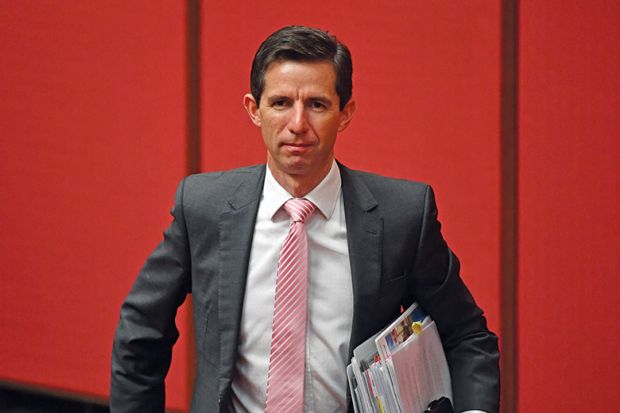Australia’s education minister has promised to be “pragmatic” in his bid to get controversial funding reforms over the line, but maintains that the package of spending cuts and tuition fee increases will not damage universities’ teaching and research.
Higher education institutions remain strongly opposed to the Liberal-led administration’s plans to cut sector funding by 2.5 per cent, slicing A$2.8 billion (£1.7 billion) off campus budgets over four years, and to increase tuition fees by 7.5 per cent. Their resistance has won them sympathisers in Australia’s Senate, where the government is struggling to win over the crossbenchers whose support is vital if the bill is to pass.
But Simon Birmingham, the education minister, told Times Higher Education that he remained “hopeful” that the legislation would get through. “Constructive and cordial” discussions were continuing, the minister said.
“The government has demonstrated itself to be very pragmatic in its dealings with the Senate across a range of major policy reform issues and we will of course be pragmatic again in terms of hearing the concerns of the necessary Senate votes and weighing them up in terms of what is viable for us to get past or not,” Mr Birmingham said. “I’m not in the business of playing these negotiations out in the public domain but obviously we will conduct these discussions to a point where hopefully we can reach an agreement.”
Universities are pushing for the government to rethink its proposal to allocate 7.5 per cent of sector funding on a performance-contingent basis, most likely judged on the sort of student outcomes used in the UK’s teaching excellence framework.
Institutions are also fearful that, if the government cannot win support for its higher education bill, it will look to impose spending controls that do not require parliamentary approval.
On this point, Mr Birmingham said that the government was “not really thinking about alternative plans”.
Universities warn that the cuts will force them to cut courses and research programmes, and will imperil their global standing.
There is also concern about the potentially negative impact of the language used by Mr Birmingham to describe higher education institutions, in particular his claim that providers had been receiving “rivers of gold” from the taxpayer in recent years.
Mr Birmingham told THE that he held Australia’s universities in “extraordinarily high regard”.
“That doesn’t absolve universities, which are majority-funded and supported by taxpaying Australians, from being held to account for being as efficient as possible in terms of their use of public and student resources, and it doesn’t entitle people to a blank cheque of public funding,” he added. “These are robust public discussions but I think my individual relationships with various leaders across the higher education landscape remains strong and we continue to work collaboratively on areas of common interest while addressing these reforms.”
Mr Birmingham described comments such as his “rivers of gold” remarks as “rhetorical flourishes”.
“In the end that’s seeking to bring to public attention, to Senate attention and perhaps to higher education attention simple realities such as the 71 per cent growth in funding that universities have seen since the demand-driven [uncapped student numbers] system was brought into being in Australia,” Mr Birmingham said. “The budget proposals we have put forward will not have a detrimental impact on their ability to deliver high-quality teaching or research.”
The Senate is scheduled to sit again in the week beginning October 16.
Register to continue
Why register?
- Registration is free and only takes a moment
- Once registered, you can read 3 articles a month
- Sign up for our newsletter
Subscribe
Or subscribe for unlimited access to:
- Unlimited access to news, views, insights & reviews
- Digital editions
- Digital access to THE’s university and college rankings analysis
Already registered or a current subscriber? Login







